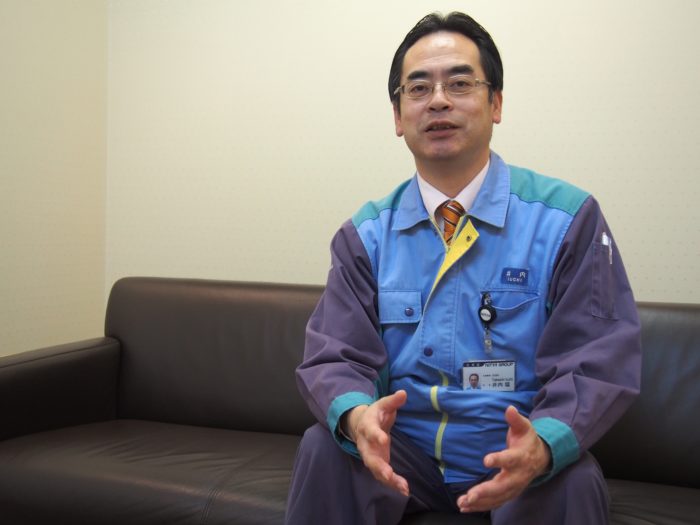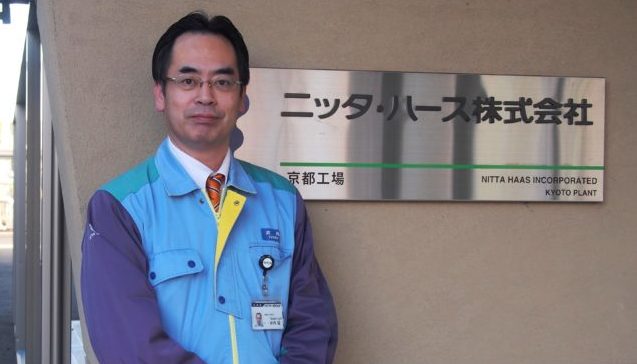Nitta Haas Incorporated, a joint venture between Japan and the United States, headquartered in Osaka, mainly sells materials for super precision polishing (CMP) of semiconductors to all over the world. Now that the production base of silicon wafers and various electronic parts which become semiconductor substrates located mostly in Asia, the overseas ratio of sales has increased and the importance of English continues to increase. However, Rather than forcing employees to train English, they are working to raise awareness of English training based on their own efforts (self-development). We asked him about the effort and his thought on it.
From spinning industry in the Meiji era to modern mobile phone, supporting Japanese technology
.jpg)
Nitta Haas Incorporated was born in 1983 as a joint venture of a Japanese company named Nitta Corporation listed on the First Section of the Tokyo Stock Exchange and an American company Rodel Inc. (now The Dow Chemical Company). Nitta was the first domestically produced industrial belt for transmission used to drive spinning equipment in the Meiji era when the spinning industry was leading the Japanese farming industry in particular, mainly at the Tomioka spinning factory etc. Throughout pre-war to post war, we supported Japan’s manufacturing technology at various production sites such as automobiles and electrical products. Nitta Haas is the company that was born to challenge a new business at the timing when that Nitta celebrates its 100th anniversary.
Our business is like a Kuroko (existence in 100% black garment), which means the invisible role supporting always behind the scenes, our final product is not appearing anywhere in the general market. To be honest, how hard we explain it to students who apply for us, it is still difficult for them to understand that we have domestic top share in semiconductor precision polishing (CMP) materials, and working on the development of new technologies and new products every day for selling to all over the world. So I explain about grinding in an easy-to-understand way, but to be a little familiar, when sharpening knives such as kitchen knives, you put a grindstone and sharpen while applying water, right? Our company is making grinding stone (which is the polishing pad which is our product) to make the blade smooth, and something like water (same polishing slurry). In the early 1990s, mobile phones, which were shoulder-type, are now evolving into smart phones and wearable watches, compact and highly functional. In addition, the functions of various products are remarkable, such as 4K TV is sold for home use, high resolution cameras are incorporated in mobile phones, cars are also put into practical use of hybrid cars and electric cars and equipped with safety mechanisms improving, but these every productization make it possible because all the electronic parts (semiconductor) that administers them are evolving day by day. As the level of polishing technology increases steadily, expanding and developing the digital society by the evolution of electronic components (higher functionality) is also a proof that we are contributing to the world.
Foreign company, yet our work could be done without English.
Since we are joint venture company between the US and Japan, it was inevitable to speak English in introducing the technologies and communicating with our parent company, because Nitta Haas’s base was in Japan, most of the employees at that time were Japanese. Of course, there were frequent telephone conferences and technical exchanges with the parent company, but at the time, limited employees who were originally fluent in English were mainly responsible for these tasks. In other words, we had an environment where we could do other work even who couldn’t speak English. However, most production bases of silicon wafers and electronic components are in Asia, and our customers are there. Also, in order to fight in the global market, we need to collaborate more closely with the Dow Chemical Company in the United States to develop our business. Even now even if I cannot speak English, I may be able to do my job but I think that “I can do better job if I can speak English” and that if you want to contribute more to the development of digital society as a company employee. Although English is an only tool, we are now into the era which the range of work doesn’t spread unless you can use the tool.
Human resource development which transforms the advantage into strength rather than concerning about elimination of weakness,
The idea that we have to increase the number of human resources who can communicate in English has existed in the company since its inauguration. This was created as a result of thinking about how to change “advantage into strength” of a company or talent rather than awareness of issue “to overcome weaknesses”. For example, when my eldest son was preparing the examination, he was strong in mathematics and science but National language was not good, I consciously made no mention about grades in the National languages at all, but encouraged him to “aim for getting 100 points in mathematics and science!” Then, after several months he was seriously working on mathematics and science and got 100 points in them. However, as the amount of learning is not balanced, the National languages gradually drops, and He couldn’t get even the scores that he was able to get until then. In that case I think it is natural to think that “In the next test I will do my best in National languages.” The important thing at that time is to encourage him to think like that, “I won’t ease up with Mathematics and science that got better scores, I will make them even stronger”. I think that this company is supposed to have this foundation (way of thinking). If he did not know what to do in getting more score of National language with his own … In that case, I can proactively hand over the workbooks and new study method. But I do not need to demand 500 yen from him for this (laugh). English training is the same, and the company are supposed to prepare necessary methods and means.
The best is…employee who want to do training should receive training.
Although the importance of English as a company is increasing, there are differences depending on job type. Compared to the sales department and the technology development department, the part of the management department and the production department still have less opportunity to use English. However, the subject of our English training is not limited in particular, and it is a mechanism that anyone who raise hands can receive either new employees, managerial positions, general affairs or sales.

Of course, the idea of putting costs on sales that leads to sales as a company is a major premise, but first of all I think that raising consciousness is important. “Study because it is necessary at work” is the same as saying “Study because it is necessary for examination.” Either passing the examination or becoming able to speak English is only one of the gates. The company supports all employees who are willing to work hard with full force. Then, when employees who could hardly talk is getting to speak English, praise and respect are created from employee around. I think motivation is not being given but being created by oneself.
It’s useless if you do only reading and listening, necessary to have more opportunity to talk
At Nitta · Haas, TOEIC tests are conducted internally in the spring and autumn, and from the year 2016, we have set 600 points as the goal score for managers. However, raising the score is not the ultimate goal, and in order to utilize English as a communication tool, it is useless not only to listen or to read, and again I think that “courage to talk” is important. As management’s interest in English increased more than before, we decided to focus on improving English conversation skills throughout the company. Although we have introduced correspondence courses etc. before, but before anything else, it is more important to make opportunities to improve conversation skills, to be honest how many times of speaking opportunity is the most important. However, it will require a reasonable cost (investment), but we thought that online English conversation had high cost performance, then we introduced “RareJob English lesson since April 2016”.
As mentioned above, we accept anyone to participate in the training, not the company who will bear the full amount of all the employees who applied for it unconditionally but the company purposely set a goal of attending 50 times of lesson in half a year. If they achieve this goal, the company will bear the full amount, otherwise it will be all their own expense. Although it may conflict with what I talked so far, this, we set the minimum of achievement of the purpose of “increasing the opportunity to talk” English in taking 50 times is the pace of twice a week (about 30 minutes / times). 32 of them completed the mandatory goal, and the average number of attendance was 62, at the maximum, there was an employee who took 124 courses, it turned out to be a quite proactive attendance.
As an achievement, more than 80% of the participants of the students felt that “the opportunity to talk has increased”. In addition, although we didn’t originally expected, when comparing it before and after taking “RareJob English lesson” on the TOEIC score, a of raising by 50 points on average as a side effect.
Do not have to be fluent, foster a culture that everyone on employee can send out
In order to promote attendance, of course urging them by mechanism of institution is needed, but I believe that the most important thing is how we can continue the motivation (taking lecture will) of students. Everyone at the time of enrollment, they were supposed to think “Alright, let’s do my best!” However, as time goes on … I think that it is “encouragement by people” to timely return this to the beginner’s mind. In that respect, at our company, the personnel person in charge of training actively talks in-house and gives feedback to the boss of the student frequently in progress, he took lessons more than anyone, spread the word in various ways within the company. Also, since we do this time’s English training based on self-development, we don’t force them as “Why do not you study English?” “Do it because it is necessary at work!” This is an extreme example, but I will teach to children who could only use forks when eating rice, “Use chopsticks like this, eat like this” right? You should not say that “Why you don’t use chopsticks!” “It would be convenient if you bring chopsticks like this and you will have fun to eat them,” While talking, they will be able to do soon. We are using chopsticks like the flow of nature, we can no longer know when we were able to use chopsticks, but English is also only tool like chopsticks after all.
Even if you cannot speak fluently, learn to have a courage to speak English to begin with, it is alright as long as you try to make an effort to speak English. Rather than being interpreted by interpreter with fluent English to customers or Dow people, it would be much better being conveyed by the person in charge of production directly tell the customer even with his poor English “I am chief of the line that makes this product. The charm of this product is○○○!”
In order to foster such a culture, we would like to make “a company that everyone can send out their own charm by themselves” in both Japanese and English. For that, I would like to continue to use “RareJob English Lesson” from now on. And if the pleasures and interests of communication by nature and English spread within the company, we could say that Nitta Haas realized “transforming from advantage to strength”. If so, the desire which training staff who accumulated various efforts at the time of introduction had will come true.




